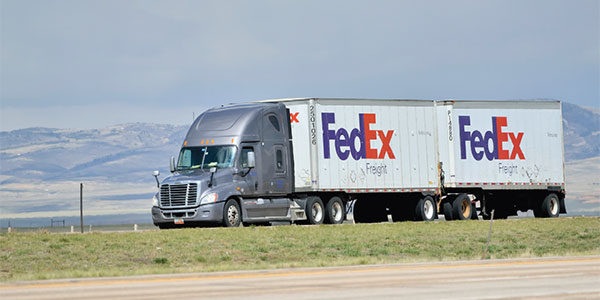FedEx chairman says he's confident Congress will agree to extend length limits on twin trailers

The chairman and CEO of FedEx Corp. said today there is a "good chance" that Congress will agree to increase the maximum length of each truck trailer on a double-hookup when it eventually passes a transportation funding bill.
Frederick W. Smith told analysts that the company is "very hopeful" that lawmakers will extend to 33 feet from the current 28 feet the length of each trailer that is part of a twin-trailer configuration. Federal law has kept the current limit in place since 1982, though 18 states allow so-called double 33s on their portions of the interstate highway system.
Smith said raising the length of each trailer is the "biggest thing the federal government can do" to immediately increase productivity, conserve fuel and reduce carbon emissions without damaging the surface-transport infrastructure by adding more weight to each rig. Smith said the change would add 18 percent of cubic capacity to the system without increasing the number of trucks on the road or the number of miles traveled.
Memphis-based FedEx has actively lobbied to change the law governing truck lengths. Smith said today that the twin-trailer initiative enjoys widespread support across the transport spectrum. Congress has begun debating the merits of the next transport reauthorization legislation to replace the extended version of the 2012 law. The current reauthorization law, which was extended last August, expires at the end of May.
Double trailers are mostly operated by package-delivery and less-than-truckload (LTL) carriers, whose shipments nearly always fill out a trailer's cubic dimensions before their load hits the federally mandated 80,000-pound weight limit. Given that the explosive growth of e-commerce will dramatically increase the shipping of lightweight packages, a combined 10-foot cubic increase would allow carriers to more cost-effectively manage their capacity, according to supporters of the concept.
Smith spoke as the company he founded reported its fiscal third-quarter results, which included the peak holiday shipping season. Overall, revenue rose 4 percent from the prior year to $11.7 billion. Operating income rose 50 percent to $962 million, while net income rose 53 percent to $580 million. The company said it experienced strong volume and revenue growth in its three transport segments—air and international carrier FedEx Express, ground parcel carrier FedEx Ground, and LTL carrier FedEx Freight. FedEx also reported significant benefits from lower fuel costs, more favorable weather conditions year-over-year, and continued gains from a major restructuring effort to increase annual profitability by $1.7 billion a year by 2016.
Launched in 2012, the initiative is built around a mix of cost cuts, efficiency enhancements and yield-boosting measures, virtually all targeted at FedEx Express, the company's core business and largest revenue generator. FedEx Express has been impacted by a migration in the U.S. and in international markets to lower-cost ground delivery services.
FedEx Express posted revenue of $6.66 billion, roughly flat over fiscal 2014 results. There, domestic and international volume growths were more than offset by the revenue-dampening effect of lower fuel surcharges and unfavorably currency exchange rates, the company said. FedEx Ground's revenue of $3.39 billion was up 12 percent from last year, while operating income rose 94 percent. Average daily volume grew 7 percent, paced by gains in business-to-business and home-delivery traffic. Revenue per package rose 3 percent due to the impact of rate increases and a shift in pricing of packages to a model based on the dimensions of the parcel instead of its weight.
The company said that some shippers have made changes in their packaging as a result of the shift, but declined to comment further. The change, which took effect in early January, was expected to increase the costs of shipping bulkier parcels that occupy a disproportionate share of space aboard a FedEx delivery van.
FedEx Freight's revenue of $1.43 billion was a 6-percent increase from the same period a year ago. Operating income of $68 million was a 94-percent year-over-year increase. Average daily shipments rose 3 percent, as did revenue per shipment. The latter increase was due to the impact of higher freight rates, the company said.
Smith, in the statement disclosing the results, said the company had a "very successful" peak period.
FedEx's acquisition late last year of third-party logistics provider GENCO Distribution System Inc. had an immaterial impact on the quarter's results, the company said. GENCO's results are being included in the FedEx Ground reporting segment, FedEx said. The transaction, terms of which were not disclosed, closed on January 30.
Related Articles

Copyright ©2024. All Rights ReservedDesign, CMS, Hosting & Web Development :: ePublishing